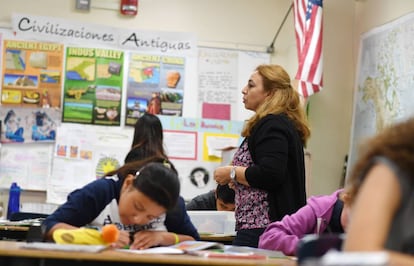García: the sixth-most-common surname in the United States
The rise in the Hispanic population in America is seeing an increase in the prevalence of family names such as Rodríguez, Martínez, López and González, which are among the 15 most frequently found in the country


The growth of the Hispanic population in the United States is reflected in the country’s most common surnames, which are increasingly Spanish in origin, while the number of Spanish speakers also continues to rise.
The Pew Research Center will soon publish new data about the increasing size of the Hispanic population in the United States. Already common family names such as García, currently in sixth place according to census data, and Rodríguez, taking the ninth spot, are expected to rise even further up the rankings last released in 2010.
By 2060, the US will be the second-most populous country of Spanish speakers in the world after Mexico
While in 1990 there were no Spanish-language surnames in the list of the 15 most common family names, by 2010 there were already six on the list. Martínez, Hernández, López and González took 10th-13th places after Rodríguez, and now the surnames Pérez and Sánchez are expected to enter the top 15 for the first time. Smith remains the most common surname in the US.
Meanwhile in six US states, at least one of the three most common surnames is of Hispanic origin. What’s more, in California and New Mexico, all of the top three are of Hispanic origin – García, Hernández and López in the case of the former, and Martínez, García and Chávez in the latter.
The Queen Sofia Spanish Institute, a non-profit organization that promotes Spanish art and culture around the world, issued a report for Spanish Language Day on Friday, which stated that the US population of Hispanic origin represents 18.3% of those counted in the census, two thirds of whom are under 35. It is estimated that by 2060 this population will amount to almost 111 million people.
By that year, the US will be the second most populous country of Spanish speakers in the world after Mexico. That will put it ahead of Colombia (48 million) and Spain (46 million). In fact, according to Spain’s Cervantes Institute, by 2060 an estimated 27.5% of Americans will be of Hispanic origin – one in three citizens.
Currently, Spanish is the second most spoken language in 43 of the country’s 50 states and 13.5% of Americans speak Spanish at home. This percentage is significantly higher in Texas (29.4%), Florida (21.8%), California (29%), New Mexico (26.1%) and Nevada (21.8%). Spanish is also by far the second most studied language at all education levels in the US. The Hispanic community has the lowest average age within the census, and 71% of Hispanic people speak Spanish at home.
The fact that the US is seeing a predominance of Hispanic surnames is a reminder of the great past, present and cultural importance of the Hispanic communityThe Hispanic Council
Globally, more than 585 million people in the world speak Spanish, of whom 41.1 million (7%) are from the US. The history of Spanish in the US dates back around 500 years to the arrival of Juan Ponce de León, a Spanish explorer known for leading the first official European expedition to Florida, and who also served as the first governor of Puerto Rico, according to the cultural organization The Hispanic Council.
“Since then, countless milestones illustrate [the importance of Spanish] in the country, such as the fact that 15% of its states and cities have names of Hispanic origin, that the first Californian Constitution was published in Spanish and English, and that the first election advertisement in Spanish was produced 61 years ago and starred the iconic Jackie Kennedy,” a statement from the organization said. “The fact that the United States is seeing a predominance of Hispanic surnames is a reminder of the great past, present and cultural importance of the Hispanic community in the country,” the statement added.
Tu suscripción se está usando en otro dispositivo
¿Quieres añadir otro usuario a tu suscripción?
Si continúas leyendo en este dispositivo, no se podrá leer en el otro.
FlechaTu suscripción se está usando en otro dispositivo y solo puedes acceder a EL PAÍS desde un dispositivo a la vez.
Si quieres compartir tu cuenta, cambia tu suscripción a la modalidad Premium, así podrás añadir otro usuario. Cada uno accederá con su propia cuenta de email, lo que os permitirá personalizar vuestra experiencia en EL PAÍS.
¿Tienes una suscripción de empresa? Accede aquí para contratar más cuentas.
En el caso de no saber quién está usando tu cuenta, te recomendamos cambiar tu contraseña aquí.
Si decides continuar compartiendo tu cuenta, este mensaje se mostrará en tu dispositivo y en el de la otra persona que está usando tu cuenta de forma indefinida, afectando a tu experiencia de lectura. Puedes consultar aquí los términos y condiciones de la suscripción digital.








































